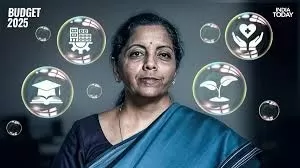Union Budget 2025: Mixed Reactions and Political Debate
As the Union Budget for 2025 was presented, reactions poured in from various political parties, industry leaders, and social sectors. While some of the responses were anticipated after the presentation, others came even before the Finance Minister began her speech, highlighting the high-stakes political atmosphere surrounding the budget.

Early Reactions: Political Parties Weigh In
The first major reaction came from members of the Samajwadi Party, who staged a walkout just before the budget was to be presented. They demanded a discussion on the tragic Mahum stampede incident, highlighting the tragedy's gravity and calling for greater attention to public safety.
The Congress Party quickly followed suit with criticism, focusing primarily on the middle-class tax cuts. While the party acknowledged the temporary relief these cuts might offer, it argued that the real issue was the persistent lack of job opportunities. Critics suggested that without substantial job creation, any tax relief would have minimal long-term impact, especially for those without a steady income.
On the other hand, the Bharatiya Janata Party (BJP) celebrated the middle-class tax cuts, with a strong applause from their benches. While there was consensus on the positive aspects of these tax measures, key questions arose about how beneficial they would be for those without regular salaries. The BJP’s stance centered around the idea that these tax cuts were crucial for empowering the middle class, but they acknowledged that economic relief should also be accompanied by strategies for job creation.
Allegations of Political Bias
The Congress Party also accused the government of focusing its fiscal benefits on election-bound states, particularly Bihar, while neglecting regions like West Bengal. This, they claimed, was a trend seen in past budgets as well, where the allocation of funds was influenced by political interests rather than national needs.
BJP leaders echoed similar concerns, emphasizing that the budget seemed more politically driven, without adequately addressing pressing public issues. Both parties pointed to a perceived lack of focus on improving the living standards of ordinary citizens.
Government's Defense: A Visionary Budget
In contrast, ministers from the ruling party praised the budget, calling it visionary and transformative. They pointed to the increase in the income tax exemption limit, now raised to ₹12 lakh, as a major step forward in empowering the middle class. Some leaders went as far as to call it a "dream budget" that would boost disposable income, stimulate demand, and create more employment opportunities.
The government also emphasized the budget's focus on making India self-reliant and a global leader, with initiatives aimed at promoting innovation, technology, and clean energy production.
Industrialists and Market Reactions
Industrialists and business leaders were also quick to respond positively to the budget, hailing it as a well-balanced plan for sustainable and inclusive growth. The personal tax rate changes for the middle class were widely appreciated, and the reduction in the fiscal deficit was seen as a positive move under the government's fiscal constraints.
The budget's focus on critical sectors such as agriculture, MSMEs (Micro, Small, and Medium Enterprises), and exports was also praised. Analysts noted that these sectors are labor-intensive and will likely create significant employment opportunities. There were also positive reactions from industries like auto and consumption stocks, which saw favorable projections.
Conclusion: A Budget with Broad Implications
In sum, the 2025 Union Budget has sparked widespread political debate and public discussion, with varying opinions on its effectiveness and the government’s priorities. The budget's focus on tax relief for the middle class, fiscal discipline, and sectoral support may foster economic growth, but critics argue that its true impact will depend on addressing structural challenges such as unemployment and equitable resource distribution.
As the dust settles, it seems that the political wrangling over the budget is far from over, and its full implications for India’s economy will continue to unfold in the coming months.
What's Your Reaction?















